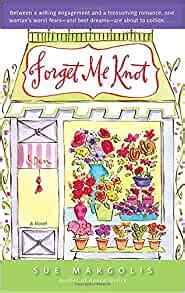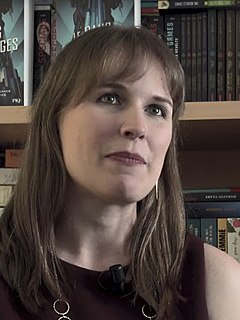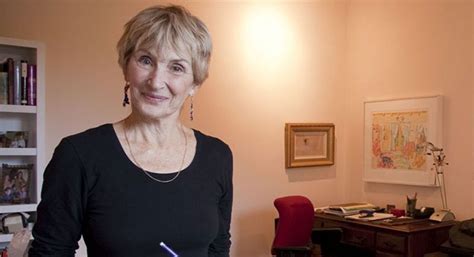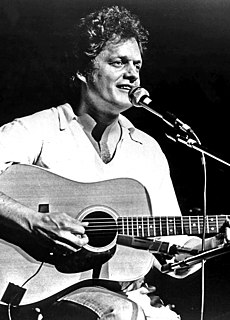A Quote by Janet Evanovich
Mrs. Zuppa was coming in from bingo just as I was leaving the building. "Looks like you're going to work," she said, leaning heavily on her cane. "What are you packin'?" "A thirty-eight." "I like a nine-millimeter myself." "A nine's good." "Easier to use a semiautomatic after you've had hip replacement and you walk with a cane," she said. One of those useful pieces of information to file away and resurrect when I turn eighty-three.
Related Quotes
So yeah, anyway - I'm thirty-four and my mother is desperate for me to get married. She thinks settling down is what you should be doing at thirty-four. How would she like it if I turned to her the day she hits eighty and said: 'Hey, Mum - when are you going to break your hip? All your friends are breaking theirs'?
I'll just be your brother from now on." he said, looking at her with a hopeful expectation that she would be pleased, which made her want to scream that he was smashing her heart into pieces and he had to stop. "That's what you wanted, isn't it?" It took her a long time to answer, and when she did, her own voice sounded like an echo, coming from very far away. "Yes," she said, and she heard the rush of waves in her ears and her eyes stung as if from sand or salt spray. "That's what I wanted.
Beside him a tiny elderly woman was leaning on a cane, studying him with curiosity. Since good manners seemed to require that he speak to her, Jon cast about for some sort of polite conversation pertinent to the occasion. “I hate funerals, don’t you?” He said. “I rather like them,” she said smugly. “At my age, I regard each funeral I attend as a personal triumph, because I was not the guest of honor.
Insofar as she recognized at all that she was dreaming, she realized that she must be exploring her subconscious mind. She had heard it said that humans are supposed only to use about a tenth of their brains, and that no one was really clear what the other nine tenths were for, but she had certainly never heard it suggested that they were used for storing penguins.
She didn't feel thirty. But then again again, what was being thirty supposed to feel like? When she was younger, thirty seemed so far away, she thought that a woman of that age would be so wise and knowledgeable, so settled in her life with a husband and children and a career. She had none of those things. She still felt as clueless as she had felt when she was twenty, only with a few more gray hairs and crow's feet around her eyes.
In Tereza’s eyes, books were the emblems of a secret brotherhood. For she had but a single weapon against the world of crudity surrounding her: the novels. She had read any number of them, from Fielding to Thomas Mann. They not only offered the possibility of an imaginary escape from a life she found unsatisfying; they also had a meaning for her as physical objects: she loved to walk down the street with a book under her arm. It had the same significance for her as an elegant cane from the dandy a century ago. It differentiated her from others.
She looked at his young face, so full of concern and tenderness; and she remembered why she had run away from everyone else and sought solitude here. She yearned to kiss him, and she saw the answering longing in his eyes. Every fiber of her body told her to throw herself into his arms, but she knew what she had to do. She wanted to say, I love you like a thunderstorm, like a lion, like a helpless rage; but instead she said: "I think I'm going to marry Alfred.
After my mother died, I learned that she'd had a scholarship to the University of Nebraska, but - in kind of a tradition that females don't do things like that - her father prevented her from going. She always said that she wasn't allowed to go to college, but until she died, I never knew that she'd had this scholarship.
She didn’t understand why it was happening,” he said. “I had to tell her she would die. Her social worker said I had to tell her. I had to tell her she would die, so I told her she was going to heaven. She asked if I would be there, and I said that I would not, not yet. But eventually, she said, and I promised that yes, of course, very soon. And I told her that in the meantime we had great family up there that would take care of her. And she asked me when I would be there, and I told her soon. Twenty-two years ago.
She was obviously useful at the UN because she had a public persona before she ever got there. She was well known. She was a spokeswoman for many important things. When she got there, what she said was paid attention to, undoubtedly much more than would have been if just Joe Blow had been made our representative to the United Nations. In that sense, I think it was useful to have her there.
I don’t know. D’you think? He’s pretty wide in the chest.” The girl looked at me, and I was frozen. So I said, “Yeah. I work out.” Violet asked me, “What are you? What’s your cup size?” I shrugged and played along. “Like, nine and a half?” I guessed. “That’s my shoe size.” Violet said, “I think he’d like something slinky, kind of silky.” I said, “As long as you can stop me from rubbing myself up against a wall the whole time.” “Okay,” said Violet, holding her hands up like she was annoyed. “Okay, the chemise last week was a mistake.





































